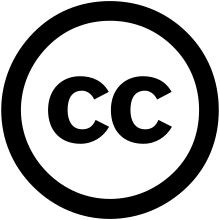RSP - OA


 Creative Commons and Open Licences
Creative Commons and Open Licences
Please note that we are not qualified to provide 'legal advice' around copyright and intellectual property. The information provided here is for guidance and information purposes only.
What are Creative Commons Licences?
Creative Commons licences ensure that the final version of a research output remains freely and permanently accessible for everyone at the point of publication, and copyright for the article will be retained by the authors.
There are six different Creative Commons licences, varying in restrictiveness, all of which allow a work to be open access.
CC BY – Creative Commons Attribution. This license allows reusers to distribute, remix, adapt, and build upon the material in any medium or format, so long as attribution is given to the creator. The license allows for commercial use. It is recommended that you use this licence wherever possible.
CC BY-SA – Creative Commons Attribution-ShareAlike. This license allows reusers to distribute, remix, adapt, and build upon the material in any medium or format, so long as attribution is given to the creator. The license allows for commercial use. If you remix, adapt, or build upon the material, you must license the modified material under identical terms.
CC BY-NC – Creative Commons Attribution-Non Commercial. This license allows reusers to distribute, remix, adapt, and build upon the material in any medium or format for noncommercial purposes only, and only so long as attribution is given to the creator.
CC BY-NC-SA – Creative Commons Attribution-Non Commercial-ShareAlike. This license allows reusers to distribute, remix, adapt, and build upon the material in any medium or format for noncommercial purposes only, and only so long as attribution is given to the creator. If you remix, adapt, or build upon the material, you must license the modified material under identical terms.
CC BY-ND – Creative Commons Attribution-No Derivatives. This license allows reusers to copy and distribute the material in any medium or format in unadapted form only, and only so long as attribution is given to the creator. The license allows for commercial use.
CC BY-NC-ND – Creative Commons Attribution-Non Commercial-No Derivatives. This license allows reusers to copy and distribute the material in any medium or format in unadapted form only, for noncommercial purposes only, and only so long as attribution is given to the creator.
Other Types of Open Licence
Open Government Licence (OGL): Can apply to works which are ‘crown copyright’ and produced by UK government bodies. An Open Government licence is equivalent to a CC BY licence in allowing a user to:
-
‘copy, publish, distribute and transmit the Information’
-
‘adapt the Information’
-
‘exploit the Information commercially and non-commercially for example, by combining it with other Information, or by including it in your own product or application’
Above uses are permitted on the condition that due acknowledgement and attribution is provided.
CopyLeft Licensing: Most commonly applied in the field of software, Copyleft principles permit the free distribution and modification of the original work under the proviso that the same rights be applied to any derivative work created from the original. This is equivalent to the terms of a Creative Commons Attribution Share-Alike (CC BY-SA) licence.
How to apply an Open Licence to your work
If you want to apply an open licence, like a Creative Commons licence, to your work, all you have to do is communicate this choice in a way that's clear to whoever encounters your work. The most simple way of doing this is add a short statement like this:
© 2024. This work is openly licensed via CC BY 4.0.
For more advice about applying open licences, consult the Creative Commons website or get in touch with the Open Research & Scholarly Publications team.
Contact Us📍 Where to find us:
|
✉️ Email: oa.lib@coventry.ac.uk
|
|
- Last Updated: Apr 3, 2025 9:39 AM
- URL: https://libguides.coventry.ac.uk/rsp/oa
- Print Page
Coventry University
Frederick Lanchester Building
Gosford Street
Coventry, United Kingdom
CV1 5DD
Telephone:+44 (0) 24 7765 7575
Email: ask-a-librarian.lib@coventry.ac.uk


